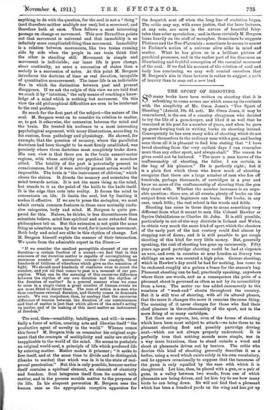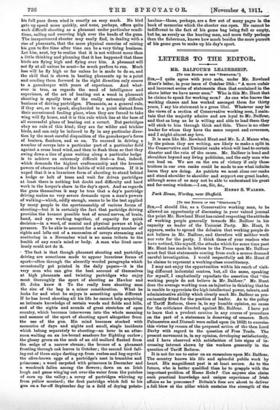THE SPORT OF SHOOTING.
SO many books have been written on shooting that it is refreshing to come across one which sums up its contents with the simplicity of Mr. Owen Jones's " The Sport of Shooting" (Arnold, 10s. 6d. net). Mr. Owen Jones, it may be remembered, is the son of a country clergyman who decided to try the life of a gamekeeper, and liked it so well that be remained at his post for a number of years, and when he gave up game-keeping took to writing books on shooting instead. Consequently he has seen many sides of shooting which do not present themselves to the ordinary man with a gun, and having seen them all it is pleasant to find him stating that "I have loved shooting from the very earliest days I can remember more than any other sport, and always shall." The reason he gives could not be bettered. " The more a man knows of the craftsmanship of shooting, the fuller, I am certain, is the bag of his pleasure." He is perfectly right ; but it is a plain fact which those who know much of shooting recognize that there are a large number of men who fire off hundreds, perhaps thousands, of cartridges in a year and know no more of the craftsmanship of shooting than the gun they shoot with. Whether the number increases is an argu- able question ; there are, at all events, plenty of books on the subject from which beginners can learn. But books, in any case, teach little ; the real school is the woods and fields.
Shooting has come in these days to mean something very different from what it meant to men like Colonel Hawker or Squire Osbaldistone or Charles St. John. It is still possible, particularly in out-of-the-way districts• in Ireland and Wales, to obtain very much the same kind of sport which the shooters of the early part of the last century could find almost by stepping out of doors; and it is still possible to get rough shooting of this kind for very little money. But, generally speaking, the cost of shooting has gone up enormously. Fifty years ago good partridge shooting could be had at sixpence an acre, and even in counties so near London as Surrey two shillings an acre was counted a high price. Grouse shooting, which in Hawker's day could be had for nothing, has come to be reckoned roughly at a guinea a brace for the season's bag. Pheasant shooting can be had, practically speaking, anywhere where there are woods, and as a consequence the price of a pheasant shoot is governed as often as not by its accessibility from a town. The motor car has added enormously to the numbers of " week-end " shoots throughout the country. But it is still true of shooting, with all its altered phases, that the more it changes the more it remains the same thing. The meaning of it never changes for those who find their chief pleasure in the craftsmanship of the sport, not in the mere firing of so many cartridges.
Yet there are aspects, too, even of the forms of shooting which have been most subject to attack—we take these to be pheasant shooting first and possibly partridge driving next—which are not always properly understood. It is perfectly true that nothing sounds more simple, nor in a way more luxurious, than to stand outside a wood and shoot at pheasants driven out by beaters. The critic who decries this kind of shooting generally describes it as a battue, using a word which exists solely in his own vocabulary, and he appears occasionally to suppose that the tameness of the game is only equalled by the ease with which it is slaughtered. Let him, then, be placed with a gun, or a pair of guns, in a valley between two woods, from one of which pheasants are being driven, and let him try to see how many birds he can bring down. He will not find that a pheasant which has been a hundred yards on the wing and has got up his full pace down wind is exactly an easy mark. No bird gets up speed more quickly, and none, perhaps, offers quite such difficult shooting as a pheasant under particular condi- tions, sailing and swerving high over the heads of the guns. The inexperienced shooter may easily find, in dealing with a rise of pheasants, that the mere physical exercise of raising his gun to fire time after time can be a very tiring business. Let him, next, try to realize that it is not without more than a little thinking and planning that it has happened that these birds are flying high and flying over him. A pheasant will not fly at all unless he must—be much prefers to run. Much less will he fly high or far unless he is made to do so, and the skill that is shown in beating pheasants up to a point and sending them forward in the right direction only comes to a gamekeeper with years of experience. And what- ever is true, as regards the need of intelligence and experience, of the art of beating out a wood in pheasant shooting is equally true of the really extremely difficult business of driving partridges. Pheasants, as a general rule, if they are, so to speak, shepherded to a point distant from their accustomed feeding place, when they are forced to take wing will fly home, and it is this rule which lies at the base of all successful plans of beating out a covert. But partridges obey no rule of this kind; they are far wilder and trickier birds, and can only be induced to fly in any particular direc- tion by the most careful disposition of the gamekeeper's force of beaters, flankers, and so on. To succeed in driving a number of coveys into a particular part of a particular field against a cross head wind, and then to flush them so that they swing down a line of guns waiting along a particular hedge is to achieve an extremely difficult feat—a feat, indeed, which demands the highest craftsmanship and the keenest powers of observation of the habits of wild creatures. If it is urged that it is a luxurious form of shooting to stand behind a hedge or belt of trees and wait for driven partridges at least there is nothing but doubt and difficulty and hard work in the keeper's share in the day's sport. And as regards the guns themselves it may be true that a day's partridge driving makes no very severe demands upon a man's powers of walking—which, oddly enough, seems to be the test applied by many people to the sportsmanship of various forms of shooting—but it is certainly the fact that partridge driving provides the keenest possible test of sound nerves, of brain, hand, and eye working together, of capacity for quick decision—in a word, of mental and physical powers at high pressure. To be able to account for a satisfactory number of rights and lefts out of a succession of coveys streaming and scattering in a November wind is no mean tribute to the health of any man's mind or body. A man who lived care- lessly could not do it.
The fact is that though pheasant shooting and partridge driving are sometimes made to appear luxurious forms of sport—often through the absurdly worded paragraphs which occasionally get printed in the daily papers—it is the very men who can give the best account of themselves at high pheasants and twisting partridges who enjoy most thoroughly the sport of shooting as Hawker and St. John knew it To the really keen shooting man the size of the bag is a minor consideration. What he looks for and what he enjoys is something quite different If he has loved shooting all his life he cannot help acquiring an intimate knowledge of certain woods and fields and hills, and of the sights and sounds of great stretches of open country, which becomes interwoven into the whole meaning and essence of the sport of shooting apart altogether from the use of the gun. His mind becomes stocked with memories of days and nights and small, single incidents which belong separately to shooting—an hour in an after- noon waiting on an ice-bound seashore for fighting curlew ; the glossy green on the neck of an old mallard flushed from the sedge of a narrow stream ; the bronze of a pheasant fronting through oak leaves in October ; the second bird fall- ing out of three snipe darting op from rushes and bog-myrtle the olive-brown eggs of a partridge's nest in brambles and primroses ; a wood carpeted with primroses in December and a woodcock fallen among the flowers ; dawn on an Irish lough and geese wing'ng out over the water from the patches of corn up the valley ; a covey of partridges whining up from yellow mustard ; the first partridge which fell to his gun on a far-off September day in a field of drying potato-
haulms—those, perhaps, are a few out of many pages in the book of memories which the shooter can open. He cannot be indifferent to the fact of his game bag being full or empty, but he, as surely as the hunting man, and more fully perhaps than the fisherman, knows how much besides the mere pursuit of his game goes to make up his day's sport.







































































 Previous page
Previous page